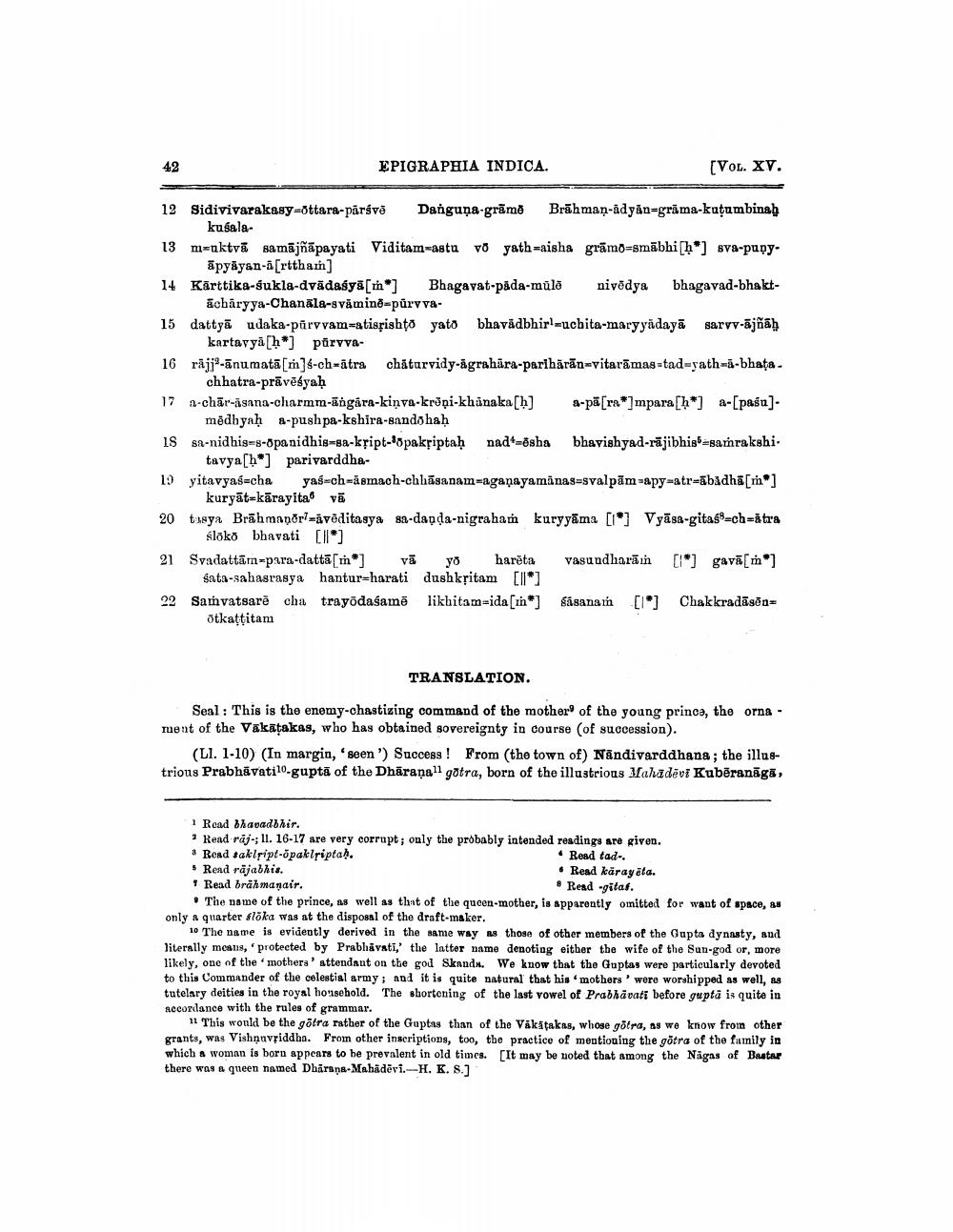________________
42
EPIGRAPHIA INDICA.
12 Sidivivarakasy-öttara-pārsvē
Danguna-grāmỗ
kusala
13 m=nktvā samājñāpayati Viditam-astu võ yath-aisha grāmō-smābhi [h] sva-pupySpyayan-artthach]
14 Karttika-sukla-dvādasya [m"] Bhagavat-pada-mūlē nivědya
bhagavad-bhakt
acharyya-Chanala-svamine-pūrvva
15 dattya udaka-purvvam-atisrishto yato bhavadbhirl-uchita-maryyadaya sarvv-ājñāḥ kartavya [h] pārvva
16 rājj-anumatā [m]s-ch-atra chaturvidy-agrahāra-parihārān=vitarāmas =tad-yath-a-bhatachhatra-pravěsyah
17 a-char-asana-charmm-angara-kiņva-kroņi-khanaka [h] a-på[rn*]mpura[b] -[pain] medhyah a-push pa-kshira-sando haḥ
18 sa-nidhis-s-opanidhis-sa-kript-opakriptaḥ nad1-osha bhavishyad-rajibhis-samrakshi. tavya[b] parivarddha
19 yitavyas-cha yas-ch-asmach-chhasanam-aganayamānas-svalpām-apy=atr=ābādhā[m] kuryat-karayita vā
20 tasya Brāhmaṇor-aveditasya sa-danda-nigraham kuryyāma [*] Vyasa-gitas-ch=ātra slöko bhavati [*]
21 Svadattam-para-dattā[m*] harēta vasundharain [*] gavā[m] sata-sahasrasya hantur-harati dushkṛitam [*]
yo
22 Samvatsare cha trayōdaśame likhitam-ida [in] Sasanam -[1]
otkaṭṭitam
vā
[VOL. XV.
Brahman-adyan-grāma-kuṭumbinab
TRANSLATION.
Read brahmanair.
Seal: This is the enemy-chastizing command of the mother of the young prince, the orna - ment of the Vakaṭakas, who has obtained sovereignty in course (of succession).
1 Read bhavadbhir.
2 Read raj-; 11. 16-17 are very corrupt; only the probably intended readings are given.
3 Read saklript-opaklriptaḥ.
Read tad-.
* Read rajabhis.
(Ll. 1-10) (In margin, 'seen') Success! From (the town of) Nandivarddhana; the illustrious Prabhavati10-gupta of the Dharaṇall gōtra, born of the illustrious Mahaādēvē Kubēranāgā,
Chakkradason=
• Read kärayēta.
• Read -gitas.
The name of the prince, as well as that of the queen-mother, is apparently omitted for want of space, as only a quarter slöka was at the disposal of the draft-maker.
10 The name is evidently derived in the same way as those of other members of the Gupta dynasty, and literally means, protected by Prabhavati,' the latter name denoting either the wife of the Sun-god or, more likely, one of the mothers' attendant on the god Skanda. We know that the Guptas were particularly devoted to this Commander of the celestial army; and it is quite natural that his mothers' were worshipped as well, as tutelary deities in the royal household. The shortening of the last vowel of Prabhavati before gupta is quite in accordance with the rules of grammar.
11 This would be the götra rather of the Guptas than of the Vakatakas, whose götra, as we know from other grants, was Vishnuvriddha. From other inscriptions, too, the practice of mentioning the götra of the family in which a woman is born appears to be prevalent in old times. [It may be noted that among the Nagas of Bastar there was a queen named Dharana-Mahadevi.-H. K. S.]




